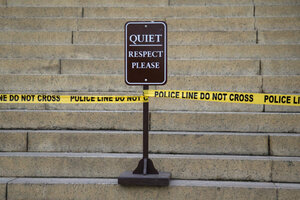Government shutdown: Obama faces political risks, too
On Day 1 of the government shutdown, polls are on President Obama's side. But if the government shutdown drags on, the economy could suffer and Obama could look ineffective.

Police tape is stretched across the steps of the Lincoln Memorial on Tuesday to close it to visitors. Congress plunged the nation into a partial government shutdown Tuesday, but President Obama could wind up with some of the blame, if a resolution is not found quickly.
Carolyn Kaster/AP
Washington
President Obama looks to be sitting pretty on Day 1 of the federal government’s first shutdown in 17 years.
Numerous polls show the Republicans taking a bigger hit than Mr. Obama or the Democrats over a shutdown, at least before it began. A Quinnipiac Poll released Tuesday shows 72 percent of Americans oppose Congress shutting down the government in an attempt to undo the Affordable Care Act (ACA), even though almost half of the public doesn’t like the new health-care law.
Republicans in Congress have only a 17 percent job approval rating, versus 32 percent for the Democrats, the poll reports. Obama’s job approval rating isn’t stellar – 45 percent – though it could be a whole lot worse.
And even though public opinion is on Obama’s side on the shutdown, that doesn’t mean he comes out of this episode unscathed. In fact, the president is likely to bear some blame, as Americans look to the nation’s capital and see a swamp of dysfunction.
“Generally speaking, the shutdown hurts everyone,” says Peter Hanson, a political scientist at the University of Denver. “So its major effect is that it will frustrate the public. They will simply blame Washington, which means it will hurt both Congress and the president.”
Still, they won’t necessarily be hurt equally. Obama has some built-in advantages. As president, he can use his bully pulpit – the White House briefing room, the Cabinet room, and the Rose Garden, for starters – to command media and public attention and to project authority.
In Rose Garden remarks Tuesday afternoon, focused on the start of online enrollment for health insurance under the ACA, Obama kept up the drumbeat on blaming the Republicans for the shutdown, which began at midnight.
“They've shut down the government over an ideological crusade to deny affordable health insurance to millions of Americans,” Obama said. “In other words, they demanded ransom just for doing their job.”
Analysts look to past government shutdowns, such as those under Presidents Bill Clinton and Ronald Reagan, and see the president coming out ahead. That may well happen under Obama, at least relative to how the Republicans fare.
But this shutdown is different from those in the past. Obama has not been actively working with the House Republican leadership to break the impasse. The Senate majority leader, Harry Reid (D) of Nevada, has carried the president’s water in the upper chamber. Add to that a healthy dose of intramural conflict among Republicans – those who support going to the mat over the ACA, a.k.a. Obamacare, and those who don’t.
Obama’s Rose Garden approach can cut two ways: It keeps him above the fray, demonstrating that he doesn’t believe he should be negotiating over a law that has already passed Congress, been signed, and upheld by the US Supreme Court. But if the shutdown drags on for more than a few days and he remains hunkered down at 1600 Pennsylvania Avenue, he risks looking uninvolved and, perhaps, uncaring. Or, at least, the public could perceive him that way.
Under the Reagan and Clinton shutdowns, both presidents actively worked with opposition leaders – House Speakers Tip O’Neill (D) and Newt Gingrich (R), respectively. Obama has spoken on the phone with Speaker John Boehner (R) of Ohio, most recently Monday night, as the hours ticked down toward the shutdown, but there was no sense that could break the impasse.
And even if the public agrees with him on where to assign blame, Obama carries other risks, if the shutdown drags on. He doesn’t have the cushion in job approval that his predecessors had, and he is operating with a weaker economy. A shutdown that drags on could take a toll on employment and economic growth, never good for a president.
Obama and the Republicans also face a larger risk, one born of not aggressively addressing the nation’s long-term fiscal imbalance – temporarily off the radar, as Washington gets bogged down by the shutdown and then Congress’s need to raise the debt ceiling by Oct. 17.
For Obama, the risk is to his place in history. If he wanted, he could make a full-court press, as he did on health-care reform in his first term, to address long-term entitlement reform, says David Primo, a political scientist at the University of Rochester.
“To the extent Obama faces a risk, it’s the long-run risk to his political legacy,” by not focusing on entitlements, especially Medicare, says Mr. Primo. “He’s standing by and letting the kids in Congress fight over nothing, essentially. The health-care law is here to stay, so all of this is a political sideshow.”

